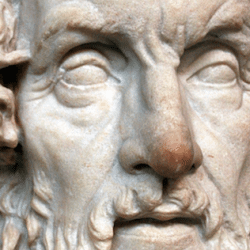This is the doctrine of Epicurus, but in a 1937 article in the American Journal of Philology , Norman DeWitt places this slogan in the context of that slogan in the context of the Epicurean doctrine of gratitude. He cites Seneca’s summary of the Epicurean view that “The life that lacks wisdom is void of gratitude and filled with apprehension; its outlook is entirely toward the future.” (Stulta vita ingrata est et trpida; tota in futurum fertur.)
DeWitt explains that the positive flip side of this negative statement is the “principle that the wise man is grateful for the gift of each new day and lives in the present,” and adds: “Although the elaboration of this doctrine is not preserved in any of the extant remains of Epicurus, one might venture the conjecture that it found a place in the essay On choice and avoidance in the following shape: ‘Do not try to know the future but make the best possible use of each day as it comes.’ This is the pattern, at any rate, into which Horace throws the advice to the mythical Leuconoe: Tu ne quaesieris . . . carpe diem, quam minimum credula postero.”
Seizing the day doesn’t mean ignoring the past. For Epicurus, it means the opposite. It means accumulating a store of memories from the past that enable one to live in daily gratitude for benefits received.
DeWitt notes that this view departs from “the traditional ethics of the Greeks” and “Solon’s wisdom in particular.” Epicurus writes, “The adage ‘Look to the end of a long life’ betrays a lack of gratitude for past blessings.” He saw gratitude as the secret to perpetuating youth: “Forgetting the good that has been he has become an old man this very day.” And in actual old age, the ability to call up a collection of memories in thankfulness is a sign of virtue and happiness: “The aged man has cast anchor in old age as in a haven, having locked securely in a grateful memory the recollection of previous blessings that he had no right to count upon.”
Past memories and the gratitude evoked play a therapeutic role in Epicurean ethics: “One must heal his misfortunes by the grateful recol- lection of what has been and by recognizing that nothing can render undone what has been done.” Though he veiled this departure from “contemporary orthodoxy,” Cicero was relying on Epicurean sources of consolation when he wrote in response to the Epicurean Luvcceius, who has lost his daughter: Das mihi iucundas recordationes conscientiae nostrae rerumque earum quas te in primis auctore gessimus.











